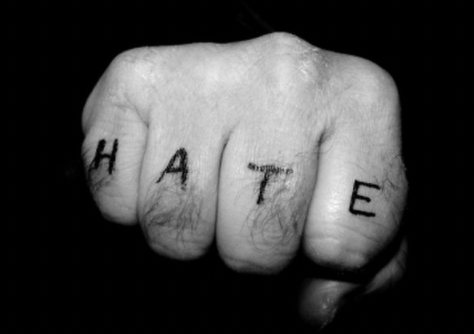A beginner’s guide to hating people: How to deal with hatred

A tattoo on the fist of a person who has a lot of hate built up.
Authors note: This topic brings up past conflicts. Out of respect for the interviewee’s privacy, I gave them the option to have their quotes in the article, but leave their names anonymous. Thank you and please read on!
Your best friend just told you they are seeing your ex-significant other. Your mom and brother are fighting downstairs. As of last week, your dad lives halfway across town. Your car is in the shop for a week. Blood rushes into your cheeks. Your fingers start typing away into google: “What should I say to a person I hate?” What appears is a long list of coping mechanisms you recognize from your school’s guidance counselor. The words, “take a deep breath,” and, “just count to ten,” enrage you even more. You think, “How does deep breathing help me not to hate someone? They still did something terrible to me.”
Trying to work with or communicate with a person you strongly dislike is draining, mentally and physically. When a person is in this state of anger toward another human being, simple annoyance can set off their worst temper.
An anonymous student said, “In middle school, I had a friend who would constantly make up false rumors about me. When I think back to that time, I see myself acting immature and very dramatic toward this person”
The most simple, yet complicated, coping mechanism is avoidance. This tactic is used in many moods, situations, and even illnesses. Avoidance is mainly used by alcoholics and addicts but can be very effective when you hate someone. If you completely want someone out of your life that you don’t have to see every single day, either in a workplace or educational setting, a simple ghost will do. Ghosting is when a person blocks or unadds another person’s account, phone number, and/or email address, with no explanation.
Ghosting works, however, it is not as effective if you work with them, have a class with them, and/or live in the same household as them.
Senior Josh Green says, “Sometimes I regret ghosting people, I think that maybe I could just talk about the status of our friendship and hopefully try to help them understand how I felt.”
The feeling of hate sometimes is misunderstood as anger. The theoretical connection between hate and anger is that hate affects the entire individual or group, as opposed to just one specific feature. You may dislike someone for who they are, or you may be angered by what they did. As a result, anger is better understood in terms of conduct. People frequently feel as though they influence the other person when they are angry.
In essence, anger is an attempt to get rid of the barrier that the other person is presenting in the way of your success.
Because hatred is an ongoing sensation, there is no psychological pattern that distinguishes it from anger. Although someone can do something to instantly enrage you, often you need more evidence to dislike someone. But in the heat of the moment, the brain and body’s arousal patterns of hate may resemble those of rage.
How can we cope with these feelings? A study from counseling.ufl.edu called, Coping with Hatred, suggests that setting boundaries, trusting your gut, and practicing self-care can be very impactful in the way you preserve your feelings towards others.
Another great way to deal with this impossible emotion is to simply avoid generalizing. Generalization is the first step when we want to understand any person coming from a different culture. Generalizations are a must to delve deeper and, ironically, comprehend the individual’s uniqueness. If your hatred toward others focuses on a group of people, such as people of a certain race, region, or religion, your thinking is irrational because you are generalizing. You are lumping an entire group of people into one “bad” category and making assumptions about them based on a demographic characteristic.
In the end, there’s no one way to simply stop hating people. The best course for resolving feelings of hate can depend upon the situation. If you feel hatred toward a person or group you don’t understand, lead with empathy and compassion. These are antidotes to hate.
Your donation will support the student journalists of Highlands High School. Your contribution will allow us to cover our annual website hosting costs.



Aydin • Jul 5, 2024 at 11:19 am
This article is so unhelpful it made me feel even more angry.
Jack Oneil • Oct 2, 2023 at 10:11 pm
I am not a child or adolescent. As it happens I find myself hating adults which I have had to deal with in the adult world who do BAD things to others without any concern for THE others.
While I can appreciate your comments I find them unuseful. I cannot lead with empathy and compassion towards a nasty hateful person.
I should think you could do better.,